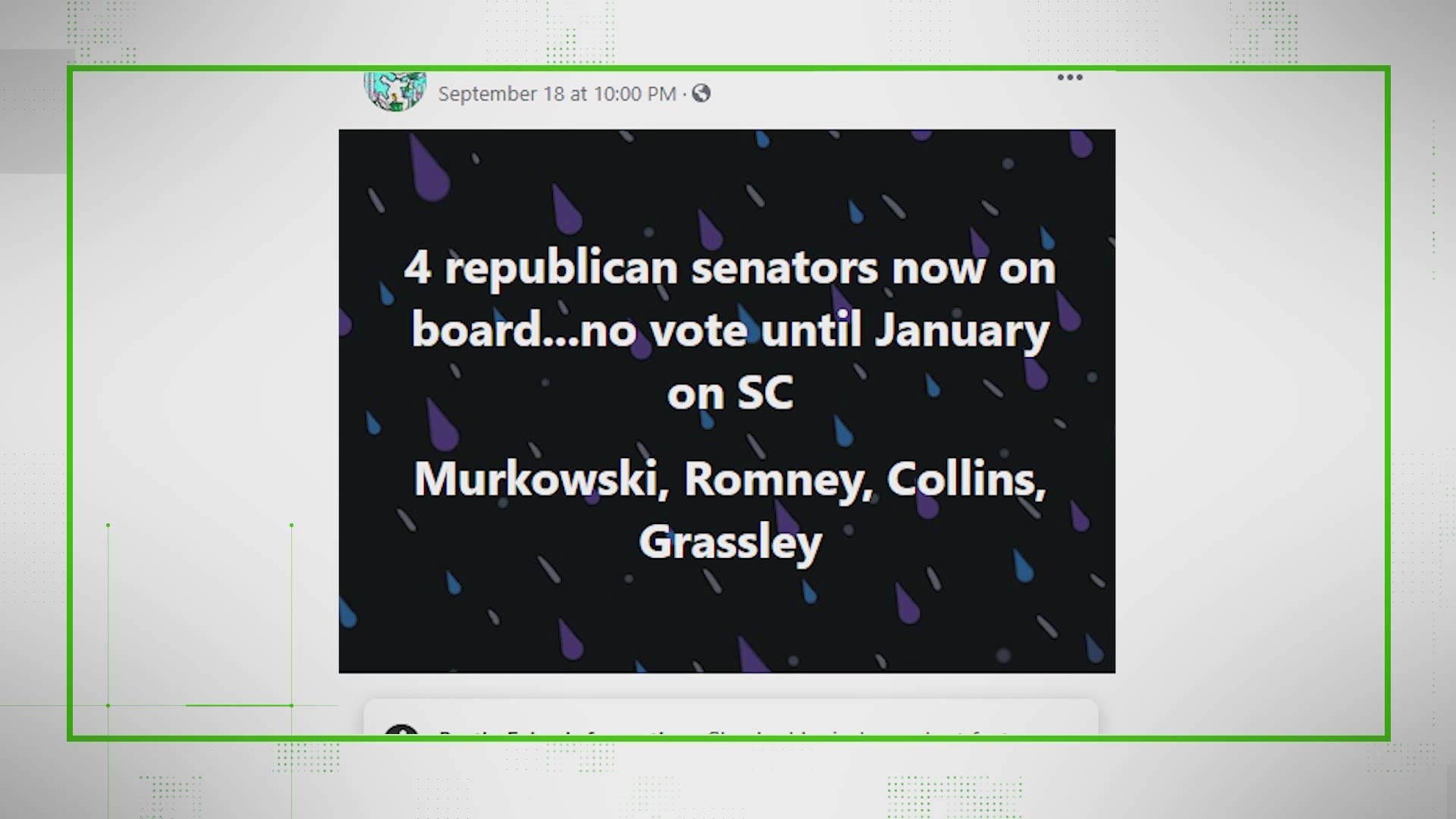There are already claims spreading around that say four Republican senators have confirmed they won't vote on a new Supreme Court justice to fill the late Ruth Bader Ginsburg's seat until after inauguration day in January.
One such post, which got over 1,000 shares when posted in a Facebook group, said the Republican senators who won't vote are Alaska's Lisa Murkowski, Utah's Mitt Romney, Maine's Susan Collins and Iowa's Chuck Grassley.
The claims' implications are significant because Republicans hold 53 seats in the Senate, which means four Republicans would have to break from the party to hold off a vote. If just three Republicans choose not to hold a vote, that could create a 50-50 tie, broken by Vice President Mike Pence.
THE QUESTION
Have four Republican senators confirmed they won't vote on a Supreme Court justice nomination until after the election?
THE ANSWER
No. Two Republican senators have said they would like to wait until after the election to vote on a justice, but haven't actually said what they'll do if a vote comes to the Senate floor anyway. No other Republican senators have stated they will definitely postpone a vote. One of those mentioned in the claim now states they support going ahead with a vote.
WHAT WE FOUND
Both Susan Collins and Lisa Murkowski have publicly said they do not support the Senate taking up a nomination before the presidential election on November 3.
Collins put out a statement on September 19 that said while she has "no objection to the Senate Judiciary Committee's beginning the process of reviewing [Trump] 's nominee's credentials," she does "not believe that the Senate should vote on the nominee before the election."
On September 20, Murkowski released a statement that said, "For weeks, I have stated that I would not support taking up a potential Supreme Court vacancy this close to the election. Sadly, what was then a hypothetical is now our reality, but my position has not changed."
Based on these statements, it's likely they both would vote against holding a confirmation vote before the election. However, that's not a guarantee. It also does not give any insight into how they'll vote if the Senate decides to hold a confirmation vote anyway.
Regardless, their support for waiting until after the election to vote on a nominee still leaves 51 Republicans possibly supporting a vote before the election. Two more would be needed to postpone a vote until after the election.
The post linked above claims Mitt Romney and Chuck Grassley are those two other senators. However, neither has said anything publicly about the Supreme Court vacancy.
Grassley, the former head of the Senate Judiciary Committee, stated on September 21 that Senate Majority Leader Mitch McConnell and current judiciary chairman Sen. Lindsey Graham have already announced their intent to go forward with the nomination. Grassley notes that in 2016, there was a Democratic president and Republican Senate majority when McConnell blocked the nomination of Merrick Garland. Now, there is a Republican president and Republican majority.
"In 2016, citing a divided government, then-Judiciary Committee Chairman Grassley and his committee colleagues exercised their constitutional authority to withhold consent on any nominee prior to the completion of the election," Grassley said in a statement. "The circumstances are different in 2020, where the American people elected a Republican President and Senate in 2016 and expanded the Republican Senate majority in 2018."
A former Utah state senator reported on September 18 that Romney had committed to not confirming a Supreme Court nominee until after inauguration day in January. Romney's communication director said that it was false. Romney gave a statement on Ginsberg's passing but hasn't said anything about her vacant seat on the Supreme Court.
Romney has not stated he opposes a vote on a Supreme Court nominee before the election. Neither has any other Republican senator except for Collins and Murkowski. Right now, there's no confirmation that a confirmation vote on a nominee would be delayed.

